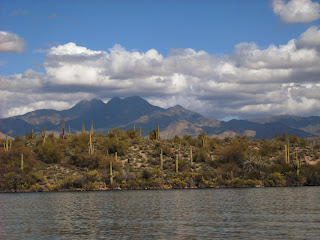Milé and I just returned from an epic road trip, a five-week getaway that led us through ten states to the desert heart of Arizona.
Admittedly, it seems a bit strange to feel the need to escape when you are lucky enough to live in paradise, like we do. But come January, when paradise is frozen over and there is no apparent end in sight, it was time for us to get away and pursue some sunshine... and sunsets.
We had a gorgeous house to call home for the month in Mesa, just outside of Phoenix, so we loaded up the van with easel and canvases, sewing machine and puppet supplies, laptop and flip flops, and made a beeline for the border. Our timing couldn’t have been worse. Within the first day we were in the grip of the ‘Storm of the Century’ that was ravaging the United States. First we encountered an ice storm, which left our van covered in an inch of ice. We passed through St. Louis at rush hour, where the weather had completely shut the city down, leaving it eerily abandoned. On the highway, we passed car after car in the ditch. Then we started seeing the road signs that you never want to see: “UNSAFE ROAD CONDITIONS: SEEK SHELTER”. From our cheap hotel room in Springfield, Missouri, we watched the weather channel with dismay. The road we’d been planning on taking was closed. We chose a detour through the Ozark Mountains, which turned out to be a taste of wonder; the roads were mercifully clear and dry, but the bare trees were encased in ice; when the sun shone through them it was pure magic.
But it was a brief respite – through Oklahoma the roads were ridiculously dangerous, so we made an unscheduled overnight stop in Seminole. The next day we finally left the snow behind and entered the charming desert landscapes of New Mexico.
The drive down was not exactly a relaxing start to the trip, but we were so much the happier to arrive at our destination. After a first day of pure, blissful relaxation, we quickly got into a routine. Milé painted four paintings while we were there, including this gorgeous Arizona landscape:
 |
| 'Near Lake Saguaro' - 36" x 48", oil on canvas, 2011, sold |
I also made 20 puppets in 4 different styles for an exhibition I have coming later this spring.
It was our first vacation in more than 2 years, so we didn’t forget to indulge ourselves. We went swimming. We ate in restaurants. We wandered around the desert and explored the art galleries of Scottsdale, and visited the Great Arizona Puppet Theater for an unforgettable puppet slam.
 |
| Puppet on display at The Great Arizona Puppet Theater |
We were incredibly productive because of the lack of distractions. A few weeks ago, we celebrated one glorious year of living at Small Pond, and we love it completely, but when we’re at home there is always a mile-long to-do list; here we were free from all those responsibilities. We had the time and the space to work at our own speed, took breaks when we wanted, read books and watched movies. When you love what you do, it’s no hardship to work while you’re on vacation. But it’s also important to take time for yourself to do nothing, to let your brain relax and your thoughts meander with no purpose. I think that on this trip we found the perfect balance between work and play, and we’ve come home renewed, refreshed, and ready to dive in to all the great things that 2011 has in store for us.
 |
| Stunning Sedona |
When we returned home a few days ago to our beloved Small Pond, I felt really good knowing that this place can provide just such an opportunity of renewal to other artists. All they need to do is make the time and we can give them the place to work, relax, find inspiration and refuel their creative engines; and take my word for it - renewal is a beautiful thing.
 |
| Two relaxed, happy artists visit the Grand Canyon |












